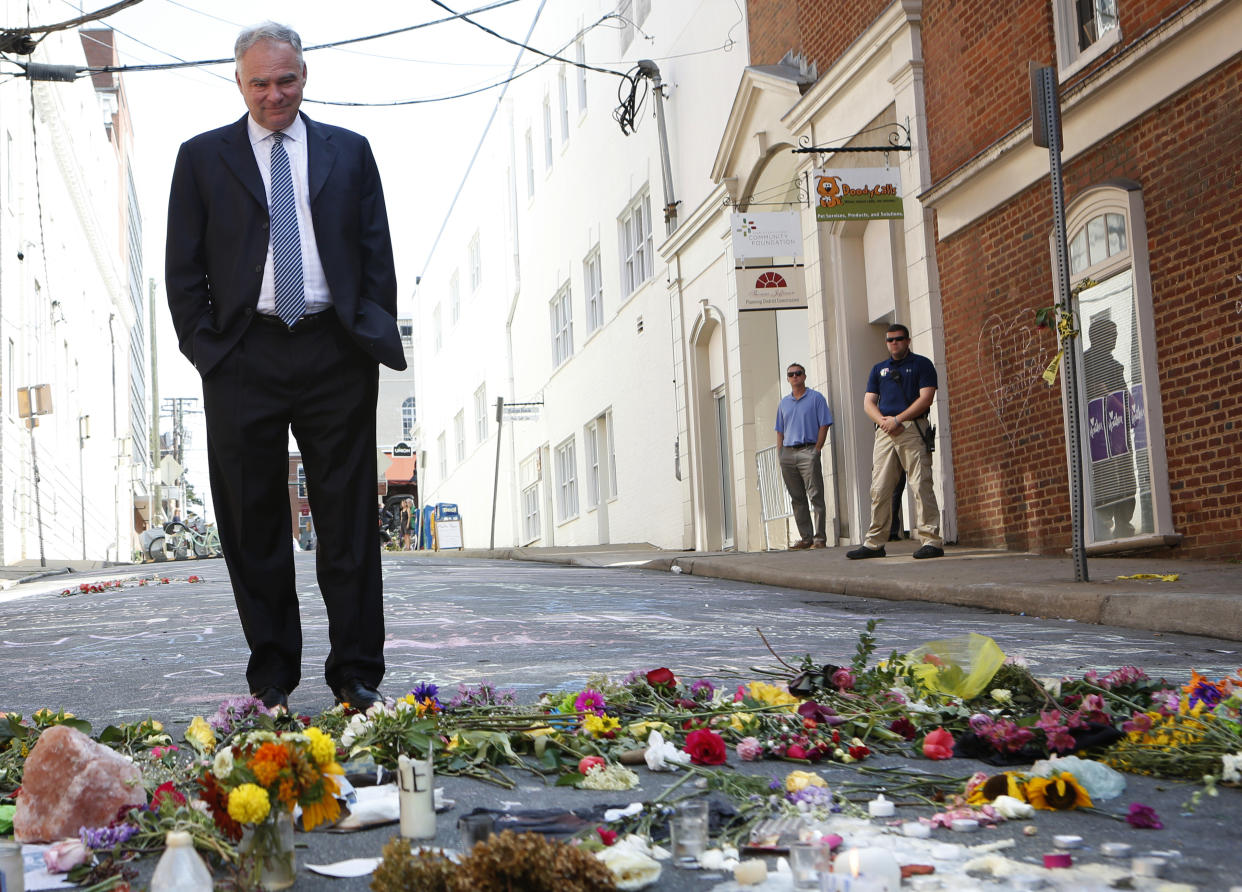Kaine: We are still in a 'battle between love and hate'

The following is an excerpt from our project Charlottesville: One Year Later. Yahoo News spoke to over a dozen people connected to the deadly August 2017 rally in Charlottesville, Va., about how things have changed over the past 12 months. To read the rest of their stories, click here.
In the weeks after the violence in Charlottesville, Sen. Tim Kaine traveled around Virginia, trying to wrap his mind around how something so horrific could have happened in his adopted home state.
It was personal. The Democratic senator knew both of the Virginia state troopers who had been killed in a helicopter crash while monitoring the deadly rally. One of them, Jay Cullen, had flown him all over the state when Kaine was governor. The other officer, Berke Bates, was friendly with Kaine’s wife, Anne Holton, who had worked as Gov. Terry McAuliffe’s education secretary. But it was more than his human connection to the tragedy that shook him.
A mayor of Richmond before his rise in state and national politics (including his stint as Hillary Clinton’s 2016 running mate), Kaine could not grasp how this could have taken place in Virginia, a state that, in his mind, had worked hard to overcome its ugly history of racial division. The first state to enshrine legalized slavery, home of the old capital of the Confederacy, Virginia had seen blood spilled by generations of people over the question of racial equality, but he had been convinced that the state had genuinely turned the page.
“I’m so proud of the arc that Virginia has been on, because I mean bluntly, our state knows hate pretty well. We know division pretty well,” Kaine says. “I really feel like we’ve turned a corner from facing backwards, and still clinging to bad old practices, to facing forward and really trying to be about equality, trying be that state for lovers, trying to be a commonwealth, i.e., a community.”
What happened in Charlottesville, Kaine says, was “very painful … personally painful” for that very reason. This was simply not the Virginia he knew and loved.
“My first thought last August was that we have some people trying to drag us back,” he says. “There are people who want to drag us back, sadly even including the president, who stokes division and hatred, who couldn’t tell who was on the right side and wrong side in a white-supremacy rally in Charlottesville, which demonstrates a level of moral confusion that almost certainly is intentional rather than accidental.”
Touring the state for a series of previously scheduled town halls in the weeks following that deadly weekend, Kaine found himself standing before other Virginians who were as shocked as he was. “This is not who Virginia is,” he told constituents again and again.
But a year later, tensions between the old Virginia and the new remain.
Take Corey Stewart, a Republican official in Prince William County with a history of making racially divisive remarks and ties to the white nationalist movement, including the organizers of the Charlottesville rally. Kaine is running for reelection against Stewart, who denies that slavery caused the Civil War, has been a staunch defender of Confederate monuments and symbols and has made “taking back our heritage” a major talking point of his campaign. Many Republicans have shunned Stewart — including a state Republican Party official who resigned his post when Stewart won the GOP nomination. But other Republicans have not — including President Trump, who endorsed him.
Sitting in his Senate office, where he could not talk about his opponent without running afoul of ethics rules, Kaine declined to speak about Stewart specifically. But a year after Charlottesville, he acknowledged that the same kind of racial tensions and political polarization that led to last year’s rally are still prevalent — not only in his state but in the rest of the country.
“We’re in a battle between love and hate right now,” Kaine says. “It’s a battle about whether we still believe in the two words at the end of the Pledge of Allegiance — are we ‘for all’ or not? And it’s sad that we have to be in that battle in some ways, but in other ways it’s incredibly energizing, and I see evidence of it everywhere.”
He pointed to the large-scale marches — including the Women’s March and the March for Our Lives — and voter turnout in Virginia’s state elections last November, when Democrats captured several key seats, including the governor’s office, surprising political pundits who believed Republicans would be boosted by rural voters, who strongly supported Trump in 2016.
“There was a huge uptick in turnout for an odd-year, traditionally somewhat low-turnout election, and I think some of it was because of Charlottesville,” Kaine says. “Some of it was people wanting to stand up loudly in their own way, say, ‘This is not who we are.’ The president can pretend this is who we are as a nation, but we’re going to stand up and say, ‘This is not who we are.’ And I see that kind of energy out there all the time now.”
Aug. 12, 2017 was “one of the worst days in our history in Charlottesville,” Kaine adds. “Around the state, I think people are standing up even stronger, with a stronger backbone to say, ‘That may have been who we were in the past, but we put all that away and we’re moving to a better future now.’ And if anything, what happened last year has made people even redouble their efforts to make progress.”
_____
Read more from Yahoo News on Charlottesville, one year later:
New Charlottesville mayor vows to keep pushing ‘until it’s done right’
Vice News journalist on what it’s like to be recognized by Nazis
‘Cryin’ Nazi’ blames rally organizer for Charlottesville ‘catastrophe’
Charlottesville photographer would return Pulitzer if he could save Heather
Former Virginia governor remembers troopers who died in Charlottesville




